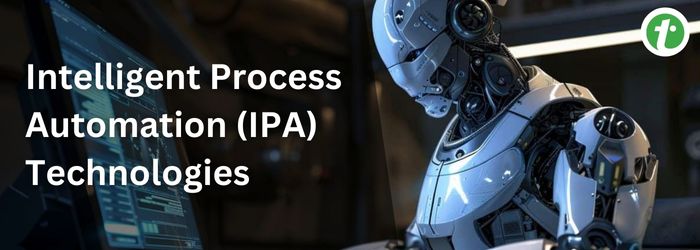
Core Technologies in Intelligent Process Automation
Intelligent Process Automation (IPA) applies numerous advanced technologies to automate and streamline business processes, enhance operational efficiency, reduce errors and costs within an organization. This chapter will provide an overview of various core IPA technologies and explain their significance in business process automation.
Intelligent Process Automation Technologies
Some of the key technologies behind the implementation and operation of intelligent process automation are explained below −

Robotic Process Automation (RPA)
RPA is a software-based automation technology that uses pre-defined sets of instructions to automate rule-based, repetitive tasks without any human involvement. RPA uses virtual robots to execute tasks, and these robots can emulate human actions in digital systems.
RPA helps businesses to free up their human employees from low-value tasks to be engaged in strategic activities. It also reduces errors, increases efficiency, and makes processes faster.
Some common examples of RPA applications in IPA include data entry, calculations, generating reports/invoices/pay slips, etc.
Artificial Intelligence (AI)
AI is a modern technology that helps to simulate human like intelligence in digital systems. In intelligence process automation, AI is used for following main purposes –
- Analyze data to identify patterns and trends
- Data-drive and cognitive decision-making
- Perform predictive analysis
- Handle unstructured data, etc.
Fraud detection, transactional verifications, identify causes of errors, etc. are common examples of AI’s application in IPA.
Machine Learning (ML)
Machine learning is an AI technology which allows digital systems to learn and improve from historical data and past experiences without needs for any external programming. In intelligent process automation, ML enables automation systems to handle complex processes, adapt to changes, and improves accuracy and efficiency over time.
A common example of application of machine learning in IPA is dynamic price adjustments in e-commerce sites, depending on demand and competition.
Business Process Automation (BPA)
Business process automation is an advanced automation approach that helps business organizations to automate their entire processes from start to finish by using advanced technologies.
As a part of IPA technologies, BPA performs the following key functions –
- Automates end-to-end business processes
- Reduces costs involved in business operations
- Enhances efficiency and consistency in processes, etc.
Natural Language Processing (NLP)
Natural language processing is also an AI technology that enables digital systems to understand and interpret human languages. In IPA, it is used in tools like chatbots, virtual assistants, etc. to automate responses to customer queries, extract data from documents, etc.
Big Data
Big data is an advanced technology used for analyzing or processing large amounts of structured, semi-structured, or unstructured data. In IPA, it integrates capabilities to analyze large process datasets to provide valuable insights for optimization of processes and workflows, and make context-driven decisions. Big data also helps to identify inefficiencies and issues in business operations.
Process Mining
Process mining is a technology that uses specialized algorithms to analyze process data to identify inefficiencies, recognize patterns, and understand how processes are actually executing. In intelligent process automation, it enables business organizations to discover and optimize their workflows.
Computer Vision
Computer visions is an advanced technology used in intelligent process automation to provide capabilities of identifying, extracting, and interpreting visual data like images and videos. In intelligent process automation, computer vision is used to automate tasks that require visual data like scanning documents for data entry.
Conclusion
In this chapter, we highlighted the functions and importance of the core technologies in intelligent process automation. Let's move forward to the next chapter and learn how intelligent process automation actually works?